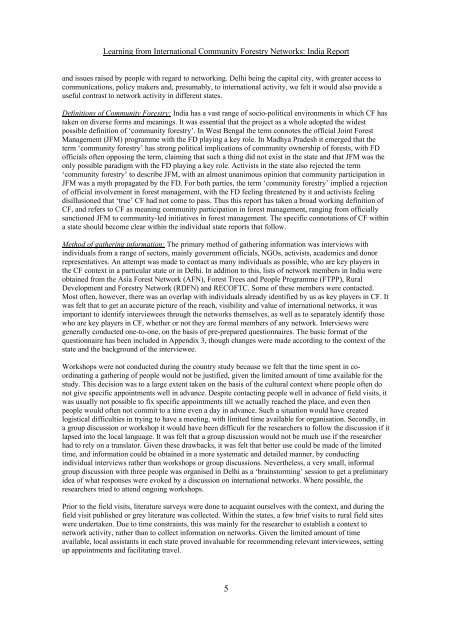Snapshots of International Community Forestry Networks: Country ...
Snapshots of International Community Forestry Networks: Country ...
Snapshots of International Community Forestry Networks: Country ...
You also want an ePaper? Increase the reach of your titles
YUMPU automatically turns print PDFs into web optimized ePapers that Google loves.
Learning from <strong>International</strong> <strong>Community</strong> <strong>Forestry</strong> <strong>Networks</strong>: India Report<br />
and issues raised by people with regard to networking. Delhi being the capital city, with greater access to<br />
communications, policy makers and, presumably, to international activity, we felt it would also provide a<br />
useful contrast to network activity in different states.<br />
Definitions <strong>of</strong> <strong>Community</strong> <strong>Forestry</strong>: India has a vast range <strong>of</strong> socio-political environments in which CF has<br />
taken on diverse forms and meanings. It was essential that the project as a whole adopted the widest<br />
possible definition <strong>of</strong> ‘community forestry’. In West Bengal the term connotes the <strong>of</strong>ficial Joint Forest<br />
Management (JFM) programme with the FD playing a key role. In Madhya Pradesh it emerged that the<br />
term ‘community forestry’ has strong political implications <strong>of</strong> community ownership <strong>of</strong> forests, with FD<br />
<strong>of</strong>ficials <strong>of</strong>ten opposing the term, claiming that such a thing did not exist in the state and that JFM was the<br />
only possible paradigm with the FD playing a key role. Activists in the state also rejected the term<br />
‘community forestry’ to describe JFM, with an almost unanimous opinion that community participation in<br />
JFM was a myth propagated by the FD. For both parties, the term ‘community forestry’ implied a rejection<br />
<strong>of</strong> <strong>of</strong>ficial involvement in forest management, with the FD feeling threatened by it and activists feeling<br />
disillusioned that ‘true’ CF had not come to pass. Thus this report has taken a broad working definition <strong>of</strong><br />
CF, and refers to CF as meaning community participation in forest management, ranging from <strong>of</strong>ficially<br />
sanctioned JFM to community-led initiatives in forest management. The specific connotations <strong>of</strong> CF within<br />
a state should become clear within the individual state reports that follow.<br />
Method <strong>of</strong> gathering information: The primary method <strong>of</strong> gathering information was interviews with<br />
individuals from a range <strong>of</strong> sectors, mainly government <strong>of</strong>ficials, NGOs, activists, academics and donor<br />
representatives. An attempt was made to contact as many individuals as possible, who are key players in<br />
the CF context in a particular state or in Delhi. In addition to this, lists <strong>of</strong> network members in India were<br />
obtained from the Asia Forest Network (AFN), Forest Trees and People Programme (FTPP), Rural<br />
Development and <strong>Forestry</strong> Network (RDFN) and RECOFTC. Some <strong>of</strong> these members were contacted.<br />
Most <strong>of</strong>ten, however, there was an overlap with individuals already identified by us as key players in CF. It<br />
was felt that to get an accurate picture <strong>of</strong> the reach, visibility and value <strong>of</strong> international networks, it was<br />
important to identify interviewees through the networks themselves, as well as to separately identify those<br />
who are key players in CF, whether or not they are formal members <strong>of</strong> any network. Interviews were<br />
generally conducted one-to-one, on the basis <strong>of</strong> pre-prepared questionnaires. The basic format <strong>of</strong> the<br />
questionnaire has been included in Appendix 3, though changes were made according to the context <strong>of</strong> the<br />
state and the background <strong>of</strong> the interviewee.<br />
Workshops were not conducted during the country study because we felt that the time spent in coordinating<br />
a gathering <strong>of</strong> people would not be justified, given the limited amount <strong>of</strong> time available for the<br />
study. This decision was to a large extent taken on the basis <strong>of</strong> the cultural context where people <strong>of</strong>ten do<br />
not give specific appointments well in advance. Despite contacting people well in advance <strong>of</strong> field visits, it<br />
was usually not possible to fix specific appointments till we actually reached the place, and even then<br />
people would <strong>of</strong>ten not commit to a time even a day in advance. Such a situation would have created<br />
logistical difficulties in trying to have a meeting, with limited time available for organisation. Secondly, in<br />
a group discussion or workshop it would have been difficult for the researchers to follow the discussion if it<br />
lapsed into the local language. It was felt that a group discussion would not be much use if the researcher<br />
had to rely on a translator. Given these drawbacks, it was felt that better use could be made <strong>of</strong> the limited<br />
time, and information could be obtained in a more systematic and detailed manner, by conducting<br />
individual interviews rather than workshops or group discussions. Nevertheless, a very small, informal<br />
group discussion with three people was organised in Delhi as a ‘brainstorming’ session to get a preliminary<br />
idea <strong>of</strong> what responses were evoked by a discussion on international networks. Where possible, the<br />
researchers tried to attend ongoing workshops.<br />
Prior to the field visits, literature surveys were done to acquaint ourselves with the context, and during the<br />
field visit published or grey literature was collected. Within the states, a few brief visits to rural field sites<br />
were undertaken. Due to time constraints, this was mainly for the researcher to establish a context to<br />
network activity, rather than to collect information on networks. Given the limited amount <strong>of</strong> time<br />
available, local assistants in each state proved invaluable for recommending relevant interviewees, setting<br />
up appointments and facilitating travel.<br />
5

















![CynefinFramework final [Read-Only]](https://img.yumpu.com/19017304/1/190x135/cynefinframework-final-read-only.jpg?quality=85)